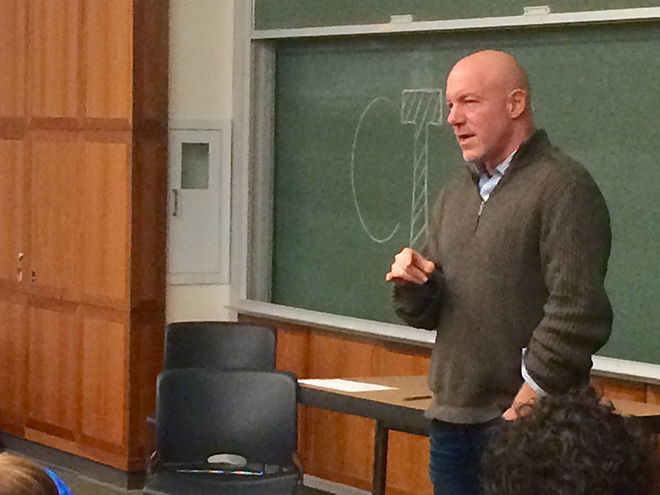
Photo by Anna Kubacsek / North by Northwestern
Mark Leibovich, Chief National Correspondent of The New York Times Magazine and a critically acclaimed author, spoke on campus Thursday, kicking off Northwestern’s Contemporary Thought Speaker Series.
Leibovich, speaking to a crowd of about 40 in Annenberg Hall, focused the bulk of his talk on how the nation’s political figures navigate public life. He recounted anecdotes of interviews with major politicians like Hillary Clinton, John McCain and Mitt Romney.
“I was thinking about how to make this discussion more timely and my thoughts immediately jumped to Mitt Romney,” Leibovich said. “I had a story on him in September that was driven in part by this era of good feeling that was oddly bubbling up around him.”
Romney had represented a figure that could never seem to get it right while the cameras were rolling, Leibovich said. After “hundreds of millions of dollars spent on creating an image for him that obviously was not successful,” what really helped Mitt turn the corner in creating a positive public image, Leibovich said, was a documentary on Netflix.
“Mitt,” which chronicled Romney’s 2012 presidential campaign, presented a refreshing portrait that Leibovich saw as “totally relaxed and really likable," he said.
“Finally we have this sort of unplugged version offered by this documentary film maker… who looked like he captured a more authentic, relaxed, somewhat funny figure,” Leibovich said.
Romney told Leibovich in an interview at his New Hampshire home, that he had learned from his errors during his campaigns, specifically his “47 percent” comments towards the end of the campaign.
“If I had to do this again, I’d insist that I literally had a camera on me at all times,” Romney told Leibovich.
Leibovich went on to discuss how other politicians checked themselves knowing that any gaffe could cause them future problems. He contrasted two politicians answers to one of his favorite questions, “What’s your favorite state?”
John McCain, perhaps misunderstanding the question, said that “he would really hate to live in Milwaukee,” while Hillary Clinton played what he saw as the politically smarter move and answered his question by saying that she loved them all.
Leibovich ended up publishing a piece in the Washington Post and included the blurb from McCain on living in Milwaukee.
“I thought nothing [of it] and I’m sure he thought nothing about it,” Leibovich said, “until he ran for president in 2008 and Wisconsin was a swing state.”
Leibovich said it was unclear what was to blame for this lack of authenticity coming out of Washington D.C., but that the responsibility fell on the politicians, the media and the voters themselves.
Before taking questions from the crowd, Leibovich spoke for a bit about his new book, Citizens of the Green Room, and how the small space served as an excellent case study in how political figures represent themselves.
“It is a great sort of demilitarized zone, theoretically,” he said, “but also a place where you can get a wide-open view of the kind of game that is really being played.”